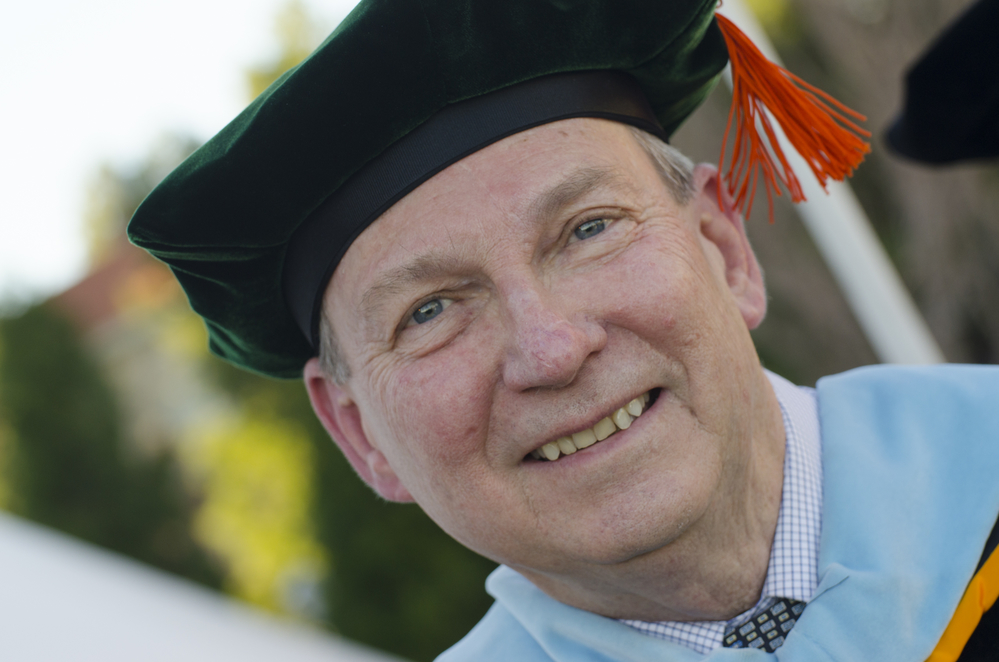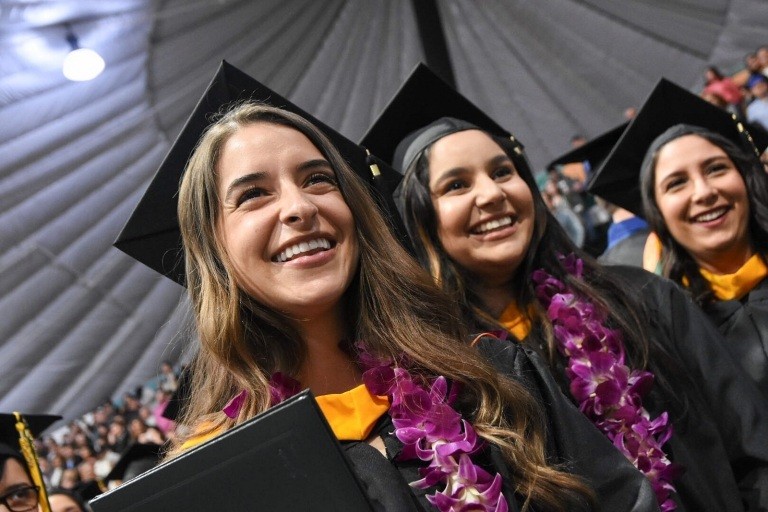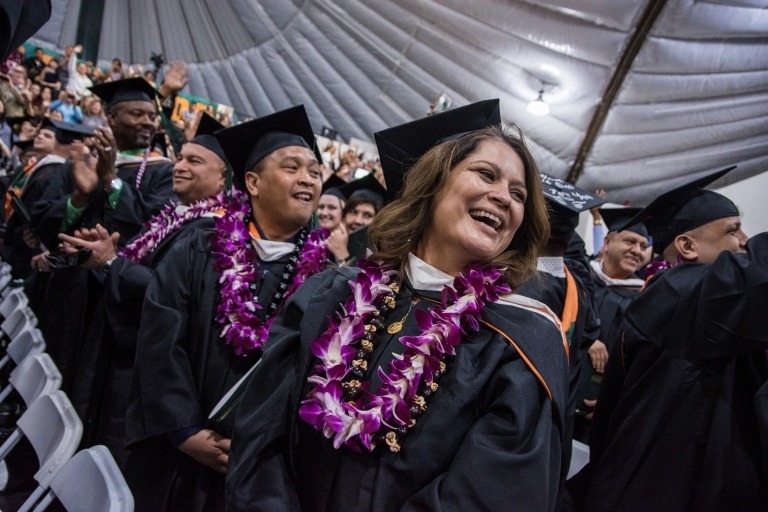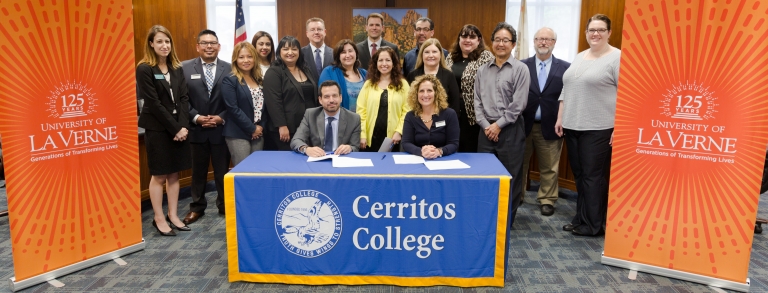A Dean’s Legacy

Stephen Lesniak stood with outstretched arms when the punt came down at an Edgewood High School football game in 1965. It was his first night game and between the glare of the stadium lights and not wearing his glasses, the halfback was blinded. The ball struck his helmet before hitting the ground.
Though he recovered the fumble, he remembers the embarrassment he felt in that moment, and the rage of his coach. It was a lesson in strengths and weaknesses. After that night, he focused on the skill his teammates could not match: speed.
“I was small, but I was the fastest person on my team. From then on, they just let me carry the ball,” he said.
For Lesniak, strengths have guided many of his decisions throughout his career in higher education. As he readies for retirement after working 39 years at the University of La Verne – most recently as Dean of Regional & Online Campuses – his true legacy will be as a leader who gave more people access to a La Verne education by breaking age and geographic boundaries.
Working in a university was not Lesniak’s first career choice. When he began his undergraduate years at Cal Poly Pomona, he intended to follow the path of his high school football coach by having the dual role of math teacher and coach in a K-12 school district.
But on his first day of substitute teaching fifth graders, he experienced the chaos of energy-filled children unable to go outside for recess due to rain. He initially vowed it was his first and last day as a sub, though he eventually returned when the children wrote apology letters. His exposure to student government in college also convinced Lesniak that working in higher education was a preferable path.
During his senior year at Cal Poly, he took on the position of Assistant Director of New Student Orientation. He soon realized he excelled at operations, logistics, working with people and managing staff.
“It gave me a taste of what it was like in higher education,” Lesniak said.
After earning a Bachelor of Arts in history, he pursued a master’s degree in counseling from California State University, Fullerton, and later a Doctor of Education in Educational Leadership at La Verne.
He began working at La Verne as Assistant Dean of Students in 1976, heading up programs such as student housing and activities, and was also Director of the Student Center. Lesniak stepped in as Acting Dean of Students for nearly a year while the serving dean was on sabbatical.
In 1980, Lesniak assumed the role of Director of Student Services in the School of Continuing Education (SCE), which included providing academic advising to off-campus students. As La Verne expanded and created its regional campus system, he managed development of his department’s services to meet growing needs. He also served as the representative of the School of Continuing Education (SCE) to most of the University’s governance committees.
Being a part of developing educational opportunities for working adults is a point of pride for Lesniak. Working adults in the 1970s and 1980s had to take time off work to pursue degrees because weekend and night classes were not offered by the higher educational community. SCE and the Campus Accelerated Program for Adults (CAPA) opened the doors for many adults to seek lifelong learning.
“It allowed them to transform their lives and the lives of their families,” Lesniak said.
Nelly Kazman, Senior Executive Director of La Verne’s San Fernando Valley Regional Campus, describes Lesniak as a leader who brought harmony to what she recalls was a sometimes difficult relationship between SCE and other University departments.
They first met 31 years ago when Kazman was a student working in Financial Aid. It was during a drawn-out meeting involving SCE and her department. She expected to encounter a “mean” administrator, but instead was greeted by someone who was well-dressed and well-mannered. In that regard, Lesniak remains unchanged.
“He is a man with high integrity who has dedicated his life to serving our students at the University,” Kazman said. “It is our challenge to continue his legacy.”
In 1986, Lesniak continued his administrative work, but also returned to the classroom as an adjunct instructor, teaching graduate-level courses. He as also taught undergraduate courses in pre-calculus and leadership early in his teaching career.
As Assistant Dean of SCE for Student Services, Lesniak directed the Distance Learning Center, expanded course offerings and assisted in obtaining accreditation for the University’s first two online degree programs. This has since expanded to five online programs.
Lesniak became Dean of Regional & Online Campuses (ROC) in 2006, heading up all administrative, budgetary, marketing and student services functions for La Verne’s eight regional campuses, CAPA and online programs. Helping create that regional campus network is another of his significant accomplishments, with he and his staff making sure that the students always came first.
“In ROC, we really live that,” he said, adding that overall success relies on creating a culture that recognizes that people count.
“We’re all not the same,” Lesniak said. “We need to allow our staff to find their strengths and develop those strengths to benefit the institutions and to obtain personal satisfaction.”
Barbara Colley, Director of Administration and Operations for ROC, describes Lesniak as a leader whose candidness stands out.
“He definitely has a way with words, which has made me laugh again and again,” Colley said. “He has been a wonderful boss, support system and friend, and he has made my experience working at La Verne an amazing one.”
In retirement, Lesniak plans to do some traveling and eventually work with a nonprofit organization in a non-administrative role. He adds that he is considering being a wine pourer at a local winery. He also hopes to utilize another one of his personal skills; Lesniak wants to return to La Verne in the near future and teach.


